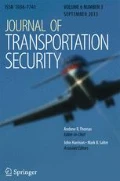Abstract
The attacks on America witnesses by the world on September 11, 2001, provided proof of the efficacy of asymmetrical warfare. The attacks exploited weaknesses in aviation security measures extant. The concepts of using commercial aircraft as weapons of mass destruction were not entirely unknown. In November of 1991 an Islamic fundamentalist plot to hijack commercial aircraft in Spain was foiled. It was determined the terrorists were to fly aircraft into two separate buildings, killing U.S. President George Bush and the second aircraft would kill the Soviet delegation (Thomas et al. 2008). Aviation has been targeted by terrorists many times and will continue to be a very attractive target to achieve their objectives. September 11, 2001, emphasized the need for revised security practices in order to deter, detect, and mitigate the risks of attacks on aviation. Prior to September 11, 2001, aviation security was a low national priority and security managers were ill prepared to protect aviation from this threat. There exists a noticeable lack of aviation security course work or degree offerings in higher education to empower the future work force. The focus of this research was to determine graduate course work, pedagogy, and the need for a graduate degree in aviation security management. This was a qualitative study conducted by interviewing ten aviation security professionals in the private and governmental sectors to determine knowledge demands for course offerings for a Master of Science degree in Aviation Security. The analysis of the data disclosed course work in seven areas of knowledge in aviation security. These seven knowledge areas included: behavioral profiling, risk management, leadership, critical thinking, terrorism, airport environment, and aviation law.
Similar content being viewed by others
References
Bilstein RE (2001) Flight in America: From the wrights to the astronauts, 3rd edn. Johns Hopkins University Press, Baltimore
Bogdan RC, Bilkleni SK (2003) Qualitative research for education: an introduction to theories and methods. Pearson Education Group Inc, Boston
Fraenkel JR, Wallen NE (2006) How to design and evaluate research in education. McGraw Hill, New York
Patton MP (2002) Qualitative research & evaluation methods, 3rd edn. Sage, Thousand Oaks
Price, J. C., & Forrest, J. S. (2009). Practical aviation security: predicting and preventing future threats. Amsterdam; Boston, Mass: Butterworth-Heinemann/Elsevier
Schneier B (2003) Beyond fear: thinking sensibly about security in an uncertain world. Copernicus Books, New York
Sweet KM (2009) Aviation and airport security: terrorism and safety concerns, 2nd edn. CRC Press, Boca Raton
Thomas, A. R. (Ed.). (2008). Aviation security management (Vols. 1–3). Westport, CT.: Praeger Security International
Author information
Authors and Affiliations
Corresponding author
Rights and permissions
About this article
Cite this article
Loffi, J.M. Curriculum and pedagogy in higher education to fulfill the knowledge demands required for a master of science in aviation security management: a qualitative inquiry of aviation security professionals. J Transp Secur 7, 169–189 (2014). https://doi.org/10.1007/s12198-014-0137-3
Received:
Accepted:
Published:
Issue Date:
DOI: https://doi.org/10.1007/s12198-014-0137-3




